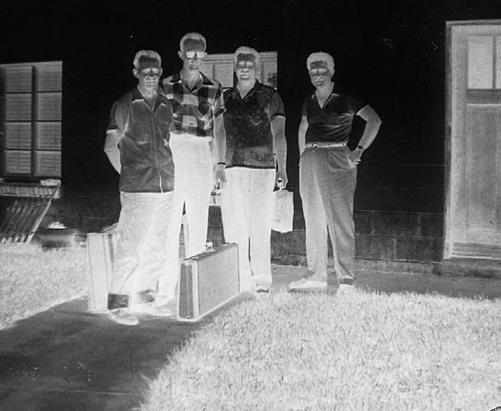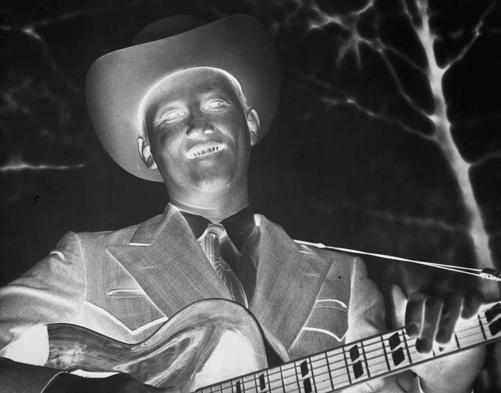House of Hits: The Story of Houston's Gold Star/SugarHill Recording Studios (Brad and Michele Moore Roots Music) (10 page)
Authors: Roger Wood Andy Bradley
Tags: #0292719191, #University of Texas Press

Country singer James O’Gwynn says, “Bill Quinn was a good guy and he took a lot of pains with us to get a good sound. He did the best you could with the type of equipment you had in those days.” Remembering the origi-3 6
h o u s e o f h i t s
Bradley_4319_BK.indd 36
1/26/10 1:12:11 PM

Musicians (left to right: Lou Frisby, Herb
Remington, Ernie Hunter, and Doc Lewis)
in front of Gold Star Studios, 1955
nal setup at the Brock Street facility, he adds, “He had egg crates all over the walls, and his recording equipment was kind of primitive, but he got a good sound.”
O’Gwynn’s eventual Starday Records label-mate Frankie Miller concurs:
“Bill Quinn was so good to work with because he would work hard to try to get you a good sound. In his day he was real good.”
Starday Records president Don Pierce, after signing a deal to merge with Mercury Records in 1957, assessed Quinn’s skills as quoted by John Tynan in
Country and Western Jamboree
magazine: “Bill is an old timer in the business and knows how to work with country artists and musicians. He knows how to get a real twangy country sound that sells.”
The eventual Grand Ole Opry star O’Gwynn (b. 1928—and billed as “The Smiling Irishman of Country Music,” even though he was born in Mississippi) recorded frequently for various labels at Quinn’s facility in the 1950s. “I did about twenty-six or twenty-eight sides over there at Gold Star Studios,” he says.
Today O’Gwynn is best remembered for the 1958 hit “Talk to Me Lonesome Heart,” which he recorded at Gold Star Studios for D Records (#1006). But his earliest affi
liation with Quinn yielded “Love in an Old Fashioned Way”
and “Bottle Talk” (#2020), as well as “I Wish You Wuz My Darling But You Ain’t” and “Love Made Slave” (#2023), both on Nucraft Records. Quinn next
l a b e l ’ s d e m i s e , n e w s t u d i o ’ s r i s e
3 7
Bradley_4319_BK.indd 37
1/26/10 1:12:11 PM

recorded O’Gwynn singing “Your Love Is Strong (But Your Heart Is Weak)”
and “Ready for Freddy” for the Azalea label (#106).
Country music defi ned much of Quinn’s studio career. Though the stylistic pursuits of his clientele remained somewhat varied, the entrepreneur who had envisioned his short-lived label as “King of the Hillbillies” was surely in his element now working with artists such as O’Gwynn.
throughout the 1950s, quinn recorded numerous other tracks for independent record labels, with the results being issued on the newer 45 rpm discs. One such label was Nucraft Records, owned and operated by Boyd Leisy, a would-be mogul who ran his record companies out of his Houston tamale restaurant. From 1953 through 1959 Leisy released at least nineteen singles, all recorded at Gold Star Studios, featuring artists such as James O’Gwynn, the Hooper Twins, the Harmonica Kid, Link Davis, and Floyd Tillman.
Another of Quinn’s regular clients was Freedom Records (not to be confused with a later jazz label of the same name), a local company owned by the Kahal family. Representative examples of the many country music sessions that Quinn engineered for that label include “Jelly Roll Blues” by Cotton Thompson, backed by Olin Davidson and His Village Boys (#5010), produced in 1950. Drew Miller and Wink Lewis’s Dude Ranchers cut a song called “What’s a Matter Baby” (#5016) featuring a solo by steel guitarist Ralph
“Dusty” Stewart. Johnny Nelms and the Sunset Cowboys, who had recorded earlier for the Gold Star label, came to Quinn’s new studio to record the song
“If I Can’t Have You” for Freedom (#5018).
For the same label, Charlie Harris with R. D. Hendon and His Western Jamboree Cowboys cut “No Shoes Boogie” (#5033), issued in March 1951. Of all the Freedom releases, this track perhaps best exemplifi es the hard-rocking, shuffl
e-beat swing style that defi ned so much of the Texas music scene prior to rock ’n’ roll. In addition to the superb electric guitar of Charlie Harris, the band featured Theron Poteet on piano, Johnny Cooper on rhythm guitar, Tiny Smith on bass, Don Brewer on drums, and (as was often the case on Freedom recordings) veteran Herb Remington (a former member of the seminal Texas Playboys swing band) on steel guitar.
Beyond the Freedom label, there were many other independent companies that hired Quinn to record their country artists during this time. Deacon Anderson, working for Bayou Records, cut the single “Just Looking through These Tears” backed with “Daddy’s Waltz.” In 1954 Quinn recorded Eddie Noack singing “How Does It Feel to Be the Winner” and “Too Hot to Handle”
(#110) for Bob Tanner’s San Antonio–based TNT Records.
Of special note, master songwriter and singer Floyd Tillman (1914–2003) came to Gold Star Studios for the fi rst time in late 1954 or early ’55 to record
3 8
h o u s e o f h i t s
Bradley_4319_BK.indd 38
1/26/10 1:12:11 PM

Eddie Noack, publicity photo, 1950s
a single for Houston-based Western Records. The A-side, written and sung by the eventual Country Music Hall of Fame inductee, was called “Save a Little for Me.” The label text credits the performance to Floyd Tillman with Link Davis and the Bayou Billies. The B-side, “Big Houston,” was written and sung by Davis “with Floyd Tillman and all the boys.”
Davis, a tenor sax player and singer, often recorded at Gold Star Studios—
playing on hits such as “Chantilly Lace” by the Big Bopper and “Running Bear” by Johnny Preston. Meanwhile, Tillman and Davis would reunite at Gold Star Studios about a year and a half later on sessions produced for Charlie Fitch’s Sarg Records label.
Although Tillman (who had cut his fi rst record as a featured singer with Leon “Pappy” Selph’s Blue Ridge Playboys back in 1938) never scored a hit with the records he made at Gold Star Studios, his presence there was signifi cant, especially in its impact on other musicians. As indicated by the title of his fi nal album,
The Infl uence
(released posthumously in 2004 on Heart of Texas Records), Tillman’s sixty-plus-year career in country music directly
l a b e l ’ s d e m i s e , n e w s t u d i o ’ s r i s e
3 9
Bradley_4319_BK.indd 39
1/26/10 1:12:11 PM
inspired countless singers and songwriters. Among the long list of classic songs that Tillman penned are “It Makes No Diff erence Now” (a hit for Bing Crosby in 1939) and his own early hits, the 1942 chart-topping classic “They Took the Stars out of Heaven” and the 1944 song “Each Night at Nine.”
Tillman is remembered today as a seminal country music composer, particularly because he wrote one of the fi rst “cheating” songs, which would become a staple of the genre in subsequent decades. His widely covered 1949
number one hit “Slippin’ Around,” as recorded by Margaret Whiting and Jimmy Wakely (Capitol #40224), helped to usher in a movement toward con-fessional social realism in country songwriting.
Though the most fertile period of Tillman’s career was in the 1940s, he returned to record again at Gold Star Studios in 1964 and 1967, and again in 1973 (by which time Quinn’s facility had been sold and renamed SugarHill).
While numerous independent labels utilized Quinn’s expertise during the 1950s, there was one in particular for which the Brock Street facility would prove to be an especially worthy base for taking its sound to the world.
4 0
h o u s e o f h i t s
Bradley_4319_BK.indd 40
1/26/10 1:12:12 PM

6
Pappy Daily and
Starday Records
major behind-the-scenes figure
in twentieth-century popular music, in Houston and beyond, was Harold W. “Pappy” Daily. This Marine Corps veteran, ex-semipro baseball player and manager,
and former accountant for the Southern Pacifi c Railroad was
an early jukebox distributor, record store proprietor, record wholesaler, and music publisher, but also a hit-making producer and label owner with close ties to Gold Star Studios during a major phase of his illustrious career.
By the early 1970s, when he ceased record production in Nashville and concentrated solely on his Glad Music publishing fi rm in Houston, Daily had owned part or all of at least four record labels. Artists whom he had signed, recorded, published, and promoted had scored numerous Top Ten hits on the country and pop charts and become national stars. Stephen Thomas Erlewine, in
All Music Guide,
describes him as “one of the most important record executives and producers of the postwar era.”
Daily got into the music business around age thirty. Concerned about possibly losing his railroad company position during the Great Depression, he opted to become the fi rst Bally’s jukebox distributor in Houston. As Daily told writer Barbara Wesolek, “I would have stayed with the railroads if there had been any security, but they were cutting people off . I didn’t know anything about the coin business or phonograph records or music.”
This new fi eld proved so lucrative that by 1932 he had created his own jukebox distributing operation, South Coast Amusements. Throughout the rest of the 1930s his company dominated the regional market for jukeboxes, coin-operated pool tables, and slot machines. In
The Complete D Singles Collection,
writer Colin Escott notes, “At one time, South Coast Amusements had offi ces
Bradley_4319_BK.indd 41
1/26/10 1:12:12 PM
in Dallas, Amarillo, Shreveport, San Antonio, Beaumont, and Corpus Christi, but Daily later closed them all down and centralized his operation . . . in Houston.”
Daily’s ventures prospered during World War II, but even more so after.
By 1946 he had opened his fi rst record store, Daily’s Record Ranch. In 1951
Daily also established a record wholesale business that covered the entire Southwest region—a well-timed and profi table undertaking, as the public appetite for hearing and collecting the latest hit discs was growing fast.
A shrewd businessman, Daily soon realized that there was potentially even more money to be had in also producing the records that he stocked on jukeboxes or distributed for sale. Though he claimed to have had no preexisting affi